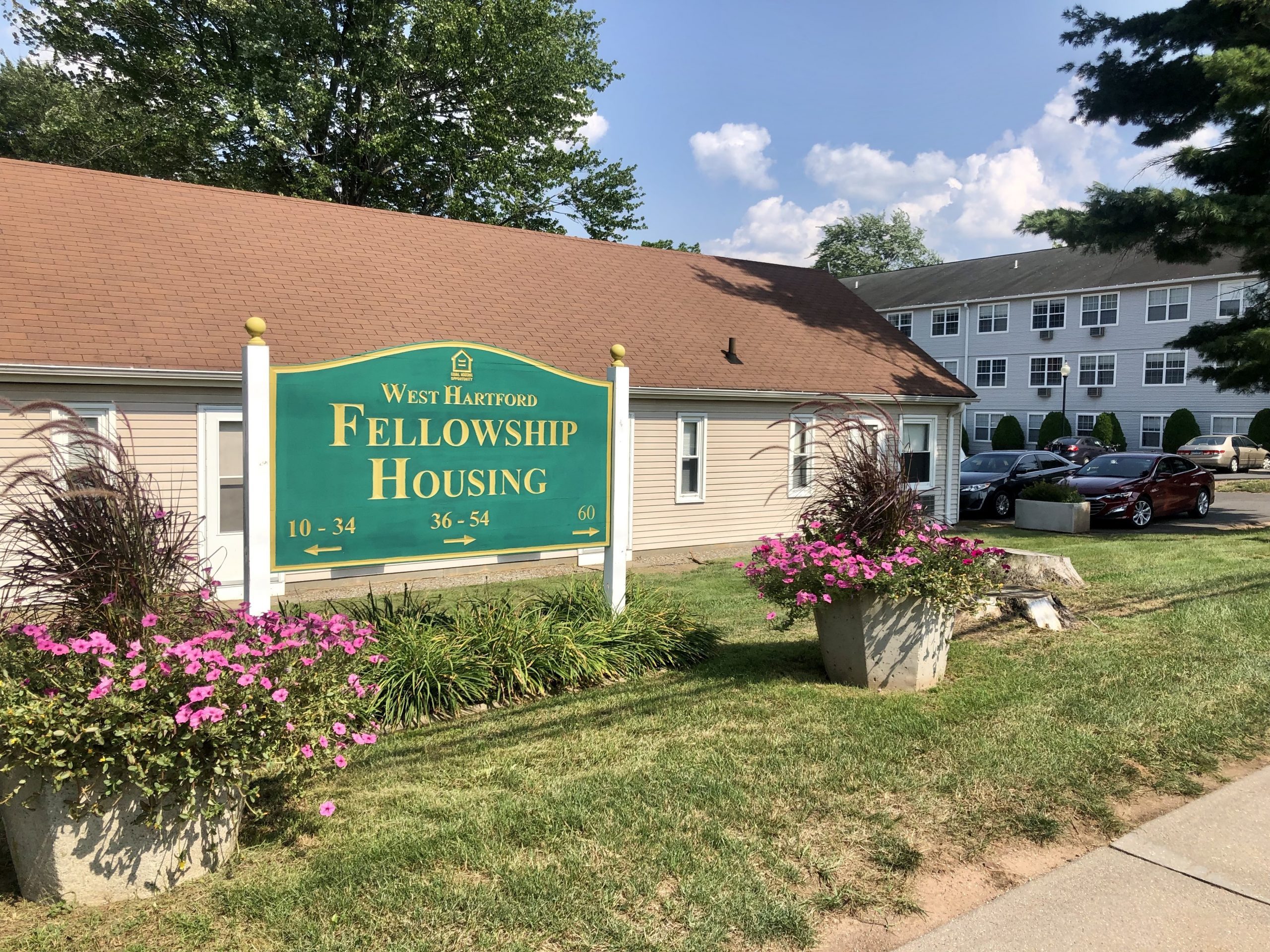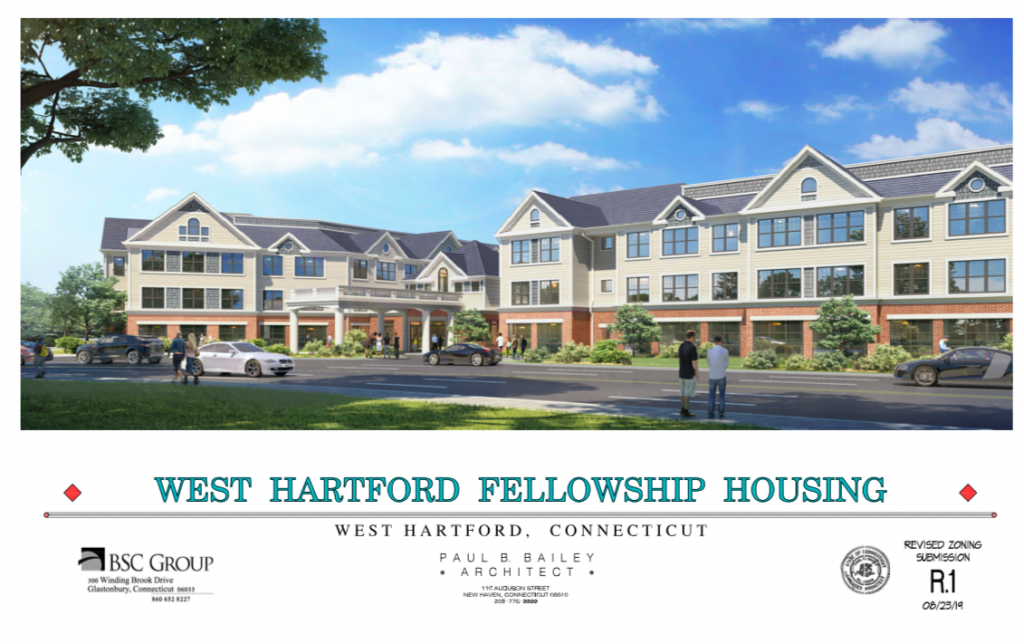Tax Credits Awarded to West Hartford Fellowship Housing Will Spur Creation of Additional Affordable Units

Audio By Carbonatix

West Hartford Fellowship Housing is located on Starkel Road in Bishops Corner. Photo credit: Ronni Newton (we-ha.com file photo)
Phase I of the redevelopment plan for West Hartford Fellowship Housing will begin to move forward following the awarding of $1.8 million in Low-Income Housing Tax Credits.

The building on the right is part of Phase I of the redevelopment of West Hartford Fellowship Housing. Courtesy image (we-ha.com file photo)
By Ronni Newton
West Hartford Fellowship Housing (WHFH) has been awarded Low-Income Housing Tax Credits and its executive director has announced that the first phase of a redevelopment project that will ultimately add 88 affordable housing units in West Hartford will soon begin to move forward.
The awarding of $1.8 million in federal tax credits will pave the way for an investment of $18 million – a substantial share of the $28 million cost for Phase I of the project.
“I want to thank Gov. Lamont, the Connecticut Housing Finance Authority, and the Department of Housing for their support,” WHFH Board President Leon Davidoff said. “We are grateful for this award as it makes preservation and expansion of affordable housing in our community possible.”
“This is the lion’s share of what we needed to kick off Phase I,” Executive Director Mark Garilli said Tuesday.
The remainder of the capital stack will likely include funding through grants, HUD loans, and other investments, Garilli said. The combined value of all four phases of the project are estimated at $100 million.
The redevelopment of WHFH has been in the planning stages for many years, and was extensively reviewed, and unanimously approved, by the West Hartford Town Council in September 2019.
The bulk of WHFH was constructed in 1970 and currently includes a total of 213 units of affordable housing, spread among 24 buildings. Residents are either age 65 or older, or have a disability.
Some of the units, located on 9.04 acres of property leased from the town at 10-60 Starkel Rd. in Bishops Corner, are Section 8 housing, and the remainder are leased for rents that are below market rate, which in 2019 ranged from $400-$650 per month, including utilities.
The overall plan is to demolish 23 of the existing 24 buildings and build six new ones – in four phases – while expanding the development to 300 units that are larger and much more up-to-date than the current apartments, with better insulation, energy-efficient features, community gathering space, first-floor laundry facilities in each building, and plumbing for in-unit washers and dryers. WHFH Development said in an announcement that they are “pursuing every available green initiative, [and] taking full advantage of renewable energy systems, high speed internet and sustainable programming.”
The entire property will continue to be designated as affordable.

Common areas, including a courtyard, will be part of Phase I of the redevelopment of West Hartford Fellowship Housing. Courtesy photo (we-ha.com file photo)
“In Phase I, 21 residents will need to be temporarily relocated to allow for the demolition of three existing buildings, to accommodate the site for two new buildings,” Garilli said. One of the new buildings will front Starkel Road, and the other will be perpendicular and face the driveway.
The Phase I buildings will include 65 units as well as new common areas for community services and programs.
WHFH hopes to be able to temporarily house the 21 displaced residents in other units within the community, and they will be the first eligible to move into the newly constructed units once they are complete. Garilli said as units become vacant throughout the property they will keep them open to be able to accommodate those being temporarily displaced.
Because additional units will have been created, as the redevelopment proceeds through the future phases other resident who will need to be displaced for the construction will definitely have a place on the property to live.
“Right off the bat we are adding 44 units,” said Garilli, and each subsequent phase will add more.
“It has taken years of thoughtful consideration to get to this point,” said Clare Kindall, a former West Hartford Town Council member who serves as WHFH Development Corporation Board president. “We thank Mayor Cantor, our town councilors, town staff, and our entire state delegation. This has been possible only because of their unwavering support. We are beyond grateful.”
“We’ve got a goal for groundbreaking in the spring [of 2023],” Garilli said, and now that the tax credits have been approved the architects have been authorized to finish the construction documents. They will also be securing the rest of the professional team and closing on their Connecticut Housing Finance Authority (CHFA) construction loans during the remainder of 2022. The construction schedule for Phase I is 18 months, Garilli said.
WHFH Development Corporation’s existing team includes architect Paul B. Bailey and development consultant Millennium Reality Company. Construction Solutions Group (CSG) represents the owners and will oversee the design and construction process and ensure that the best interests of WHFH and residents are met. Garilli is a CSG project executive and was named WHFH executive director in 2021 and will oversee the project through redevelopment.
Garilli said he is inspired by the commitment of residents, staff, and community leaders to the mission of WHFH, and their commitment to making a difference. “I am excited to improve the lives of our residents, enhance awareness, and direct our focus on fund development,” he said, to ensure the success of the project.
Barkan Management, the onsite property manager, is responsible for day-to-day operations and coordination with the residents.
The newest of the existing WHFH buildings, a three-story structure built in 1990, will receive exterior updates but will not be demolished. That building, at 60 Starkel Rd. includes a total of 44 units – studios and one-bedrooms and the development’s only existing two-bedroom unit. Six are handicapped-accessible units.
Like what you see here? Click here to subscribe to We-Ha’s newsletter so you’ll always be in the know about what’s happening in West Hartford! Click the blue button below to become a supporter of We-Ha.com and our efforts to continue producing quality journalism.



